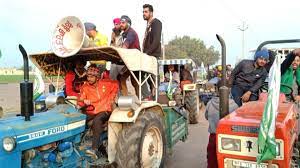
In a stern rebuke to protesting farmers gathered at the Shambhu border with numerous tractors, the Punjab and Haryana High Court asserted on Tuesday that tractor trolleys cannot be utilized on highways. The bench, comprising acting Chief Justice GS Sandhawalia and Justice Lapita Banerji, also scrutinized the Punjab government’s decision to permit such large gatherings of farmers.
Expressing concerns over the violation of motor vehicle regulations, the bench remarked, “According to the Motor Vehicle Act, you can’t use tractor-trolleys on the highway. You are travelling from Amritsar to Delhi on trolleys.” Emphasizing the importance of upholding both rights and constitutional duties, the court underscored the inconvenience caused to residents and the impediment to emergency services and pedestrian movement due to the ongoing road blockade at Shambhu border since February 13.
The court’s scrutiny stemmed from a public interest litigation (PIL) filed by advocate Uday Pratap Singh from Amravati Enclave, Panchkula. Singh highlighted the disruption caused by the blockade and urged the court to lift restrictions imposed under Section 144 of the Criminal Procedure Code. Additionally, he sought the restoration of mobile internet services and bulk SMS in various districts of Haryana affected by the farmers’ agitation.
The farmers’ demands, including legal assurance of minimum support prices (MSP) for all crops, implementation of the Swaminathan Commission’s formula, debt waivers, and pension for farmers and laborers, have fueled their continued presence at the Shambhu and Khanauri border points on the Punjab-Haryana border. Despite four rounds of unsuccessful talks with the central government, farmer leaders remain resolute in their protests.
During the proceedings, the Punjab and Haryana governments submitted status reports on the ground situation, prompting the court to schedule the next hearing for the following week. The court has requested a comprehensive report on the outcomes of dialogues between government representatives and the protesting farmers by the adjourned date.
Sources By Agencies

